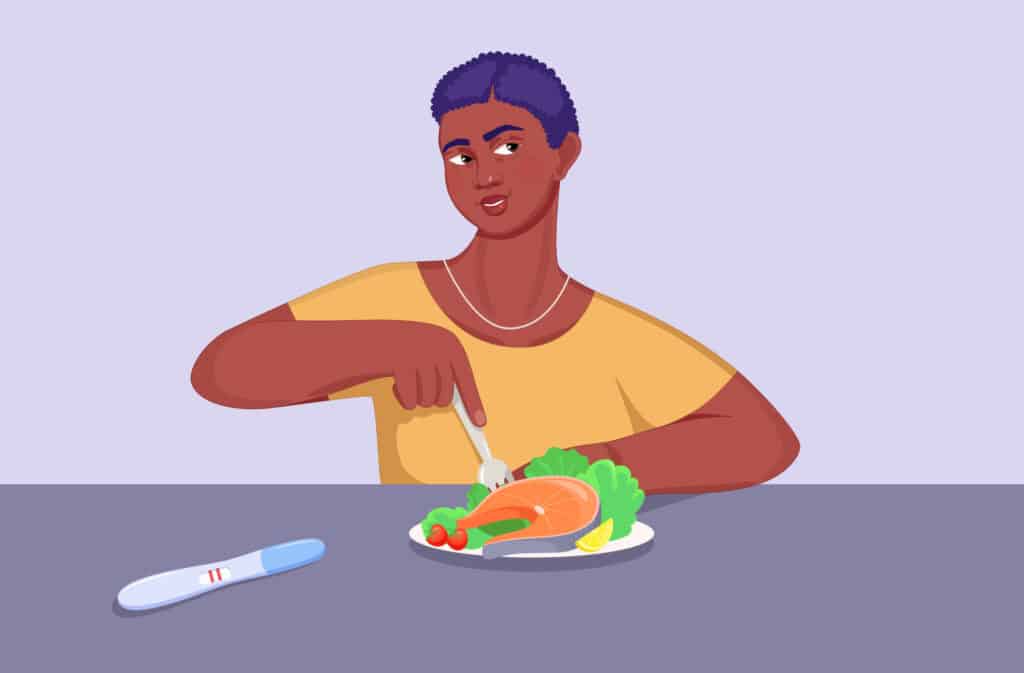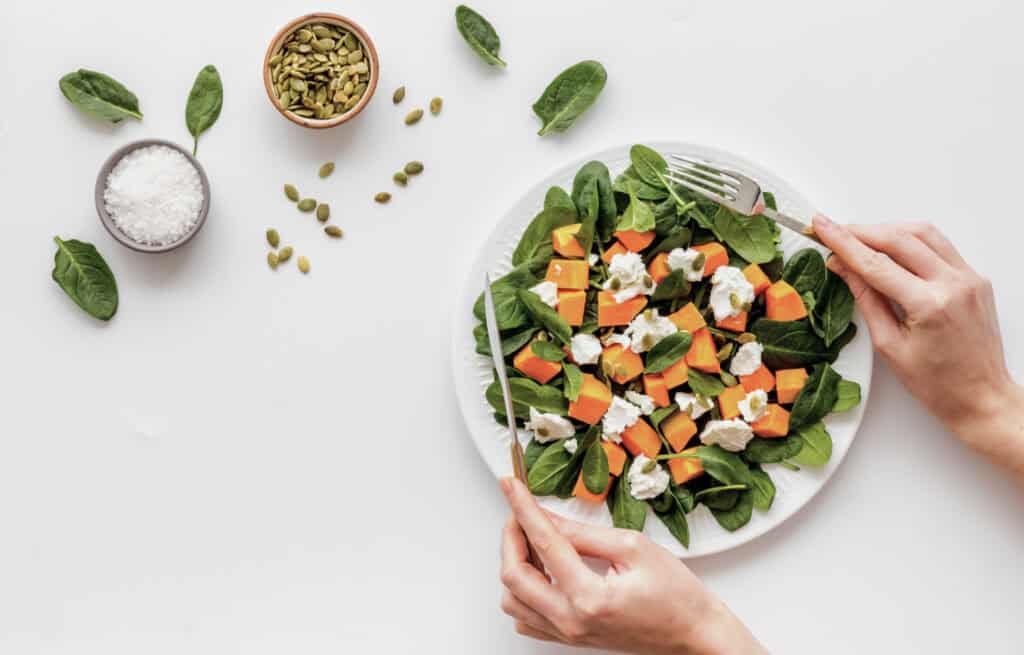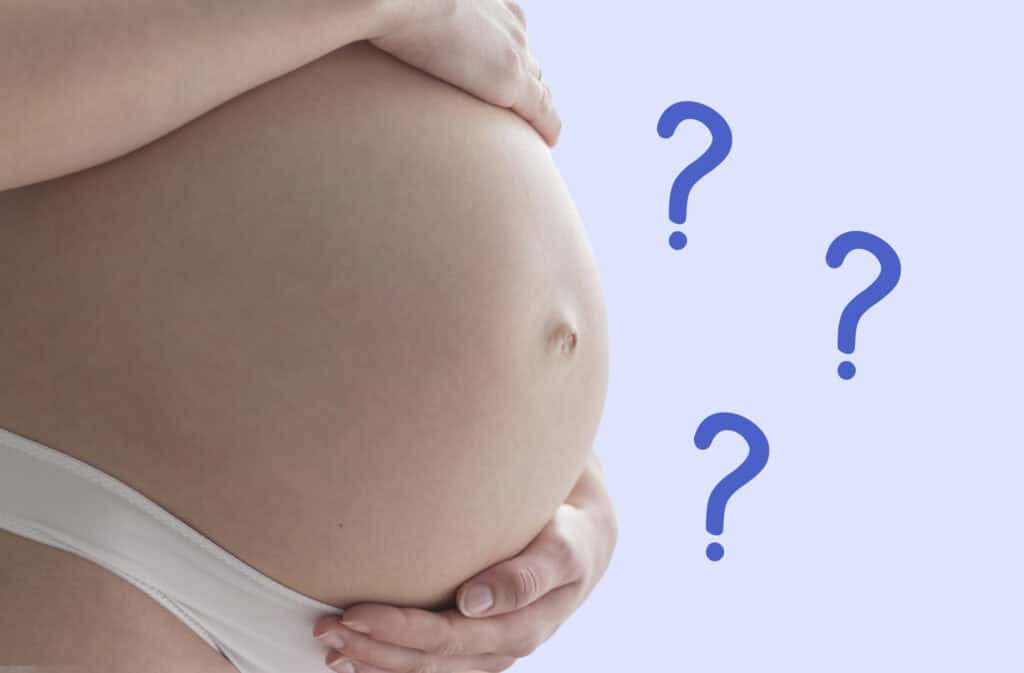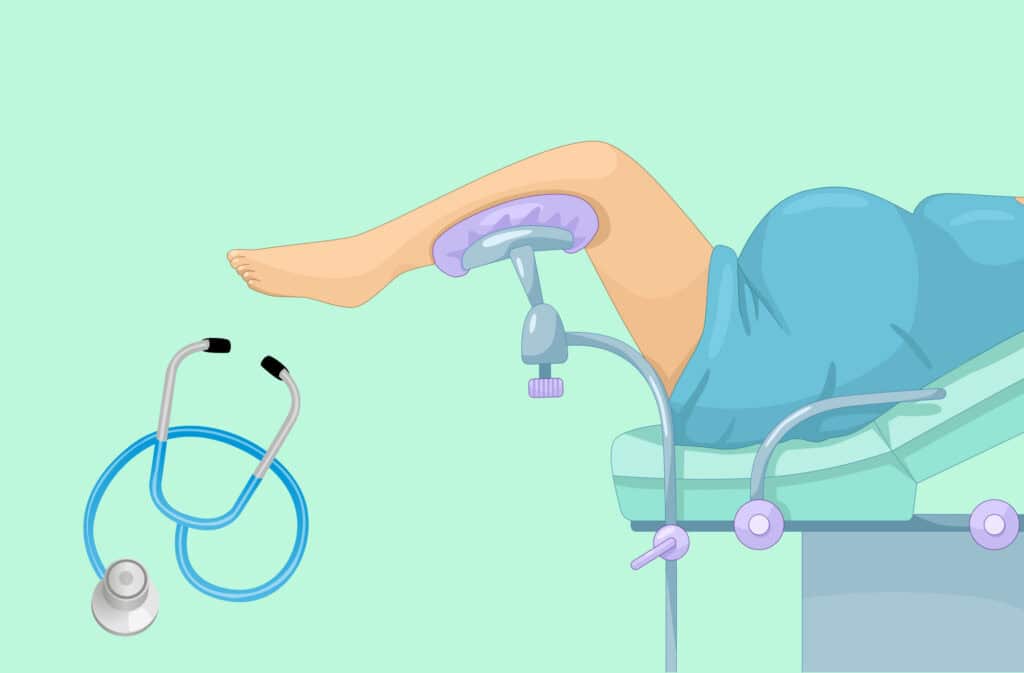Femia > Health Library > Pregnancy > Pregnancy health > Can you eat salmon while pregnant? Health benefits and safety tips
Can you eat salmon while pregnant? Health benefits and safety tips

- Updated Feb 10, 2025
- Published
CRAFTED BY HUMAN
Crafted by human At Femia, we provide accurate and up-to-date information at every stage of your journey, from trying to conceive, pregnancy and postnatal support. All content is created by a real person based on in-depth research and own professional experience. Femia ensures that you will receive expert advice, strict accuracy and a personalized approach from our authors/medical experts. Learn more about our editorial policy.
FACT CHECKED
Fact checked At Femia Health, we maintain the highest standards of editorial excellence in delivering content focused on helping you conceive, guiding you through pregnancy, and supporting you postpartum. Explore our content review principles to learn how we ensure the accuracy and quality of our health and lifestyle tips for every stage of your journey.
Yes, you can eat salmon while pregnant. It’s a low-mercury fish rich in omega-3 fatty acids and essential nutrients. However, avoid raw or undercooked salmon, such as smoked salmon, to reduce the risk of foodborne illness.
Salmon is known for its many health benefits, but if you’re pregnant, you might be asking, can you eat salmon while pregnant? The good news is that salmon is not only safe to eat during pregnancy, but it also offers a wide range of nutrients that support both maternal health and fetal development. However, there are important guidelines to follow, especially regarding smoked salmon. This article will explore the benefits and safety precautions of eating salmon during pregnancy, helping you understand the best ways to enjoy this nutritious fish.
designed just for you
Personalized meal plans, symptom tracking, and more with the Femia
Is salmon safe during pregnancy?
Yes, salmon is considered one of the safest fish to eat during pregnancy because it is low in mercury. Unlike larger fish like swordfish or king mackerel, which can contain high levels of mercury, salmon has minimal mercury content, making it a great option for pregnant women.
Mercury is a toxic metal that can affect fetal brain development, so it’s crucial to avoid high-mercury fish. By choosing salmon and other low-mercury seafood, you can enjoy the benefits of fish without the risks.
👉Find out more: Can pregnant women eat shrimp? Safe guidelines for pregnancy
Can you eat salmon while pregnant?
Yes, pregnant women can safely eat salmon as long as it is fully cooked. The FDA and EPA categorize salmon as a low-mercury fish, making it one of the safest seafood choices during pregnancy. Pregnant women are advised to eat 8-12 ounces of low-mercury fish per week, and salmon fits perfectly into this recommendation.
Eating salmon during pregnancy can provide essential nutrients that support fetal development, but it’s important to avoid raw or undercooked salmon, which can carry bacteria and parasites that may be harmful during pregnancy.
Here are a few ways to enjoy salmon during pregnancy:
- Grilled or baked salmon: A delicious and healthy way to get your omega-3s.
- Salmon salad: Combine cooked salmon with leafy greens and vegetables for a nutritious meal.
- Salmon stir-fry: Pair cooked salmon with colorful veggies for a balanced dish rich in vitamins.
Can you eat smoked salmon while pregnant?
Smoked salmon, often served cold, poses a potential risk for pregnant women due to the risk of Listeria, a type of bacteria that can cause serious complications during pregnancy, including miscarriage, preterm labor, and stillbirth. For this reason, it’s generally advised to avoid smoked salmon unless it has been thoroughly cooked.
However, hot-smoked salmon is safer because it has been cooked during the smoking process. If you’re craving smoked salmon, opt for hot-smoked varieties, or reheat the cold-smoked salmon until it’s steaming hot to reduce the risk of bacterial contamination.
👉Find out more: Which food can cause miscarriage: A comprehensive guide
Is salmon good for pregnancy? Understanding the benefits
Yes, salmon is an excellent choice during pregnancy because it is packed with essential nutrients that are beneficial for both mother and baby. Some of the key benefits of eating salmon during pregnancy include:
- Rich in omega-3 fatty acids (DHA and EPA): These fats are crucial for the development of the baby’s brain and eyes. Salmon is one of the best sources of omega-3s, which are important throughout pregnancy.
- High-quality protein: Protein is essential for the growth of fetal tissues and organs, and salmon provides a lean source of this nutrient.
- Vitamins and minerals: Salmon is rich in vitamins like vitamin D and B12, as well as minerals such as selenium and iodine. These nutrients play an important role in supporting your immune system, bone health, and the baby’s nervous system development.
Eating salmon in moderation can help you meet your nutritional needs during pregnancy, making it a great addition to your diet.
How much salmon is safe during pregnancy?
While salmon is a safe and nutritious choice during pregnancy, it’s important to eat it in moderation. The FDA recommends that pregnant women consume 8-12 ounces of low-mercury fish per week, which equals about 2-3 servings. This can include cooked salmon, making it a great option for weekly meals.
Here are a few tips to safely enjoy salmon during pregnancy:
- Stick to fully cooked salmon: Avoid raw or undercooked salmon, including sushi or sashimi.
- Opt for wild-caught salmon: Wild salmon is often considered a healthier choice as it is lower in contaminants like PCBs (polychlorinated biphenyls) compared to farmed salmon.
- Balance your intake: While salmon is low in mercury, it’s still important to stick to the recommended weekly servings to minimize any risk.
designed just for you
Personalized meal plans, symptom tracking, and more with the Femia
Questions from the Femia community
Can I eat salmon sushi while pregnant?
No, it’s best to avoid raw salmon in sushi or sashimi during pregnancy due to the risk of bacterial and parasitic infections. Stick to fully cooked salmon in your sushi rolls or opt for other cooked fish or vegetable options.
Is canned salmon safe during pregnancy?
Yes, canned salmon is safe to eat during pregnancy as long as it is fully cooked. It’s a convenient option that also contains omega-3 fatty acids and other nutrients. Be mindful of added salt if you’re watching your sodium intake.
Can I eat salmon every day while pregnant?
While salmon is safe and nutritious, it’s important to eat it in moderation. Stick to 2-3 servings of low-mercury fish, like salmon, per week to stay within the recommended guidelines. Eating salmon every day may increase your mercury exposure over time.
The bottom line
Salmon is a safe, nutritious, and delicious addition to your pregnancy diet when eaten in moderation and fully cooked. Rich in omega-3 fatty acids, protein, and essential vitamins, salmon supports fetal brain and eye development, making it a great choice for pregnant women. Avoid raw or undercooked salmon, such as in sushi or cold-smoked varieties, to minimize the risk of bacterial infections. By following the recommended guidelines, you can enjoy the many benefits of salmon while keeping both you and your baby healthy.
References
- U.S. Environmental Protection Agency. “EPA-FDA Advice About Eating Fish and Shellfish.” EPA, 11 May 2023, https://www.epa.gov/choose-fish-and-shellfish-wisely/epa-fda-advice-about-eating-fish-and-shellfish#:~:text=The%20Dietary%20Guidelines%20for%20Americans%20states%20that%20to%20consume%20those,%2C%20plaice%2C%20pollock%2C%20salmon%2C.
- U.S. Food and Drug Administration. “Listeria (Listeriosis).” FDA, https://www.fda.gov/food/foodborne-pathogens/listeria-listeriosis.
- “Tuna, Salmon, and Other Fish During Pregnancy.” Parents, https://www.parents.com/pregnancy/my-body/nutrition/tuna-salmon-and-other-fish-during-pregnancy/.
- American Pregnancy Association. “Seafood and Pregnancy: What to Eat and What to Avoid,” https://americanpregnancy.org/healthy-pregnancy/nutrition/seafood-and-pregnancy/.

Get 1 to 3-month pregnancy diet chart and first trimester meal plan from expert. Explore the best pregnancy food chart with essential nutrients for your and baby health.

Learn about cryptic pregnancy, its causes, and how to detect it. Discover risk factors and common cryptic pregnancy symptoms. Expert insights from Femia.

Learn about cervical checks during pregnancy, including what to expect, when they typically happen, and how they can help monitor your progress.

